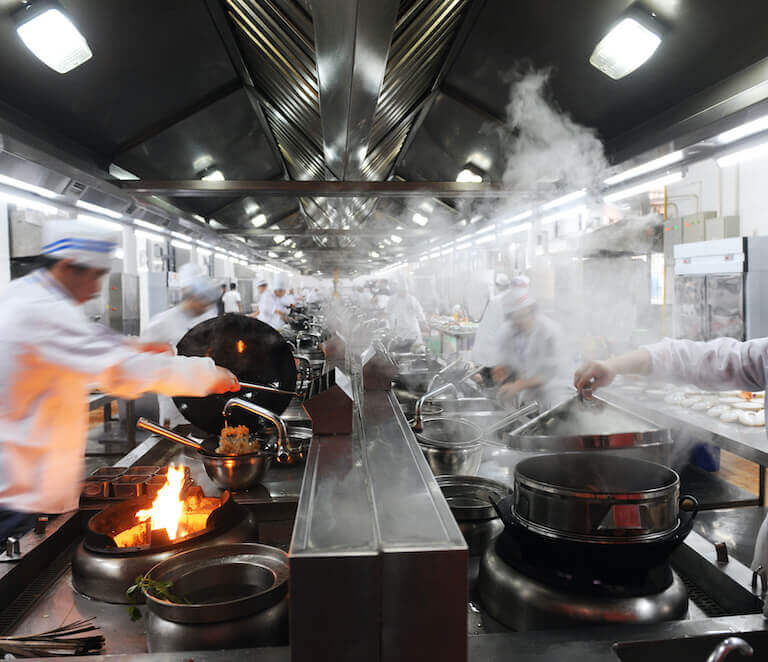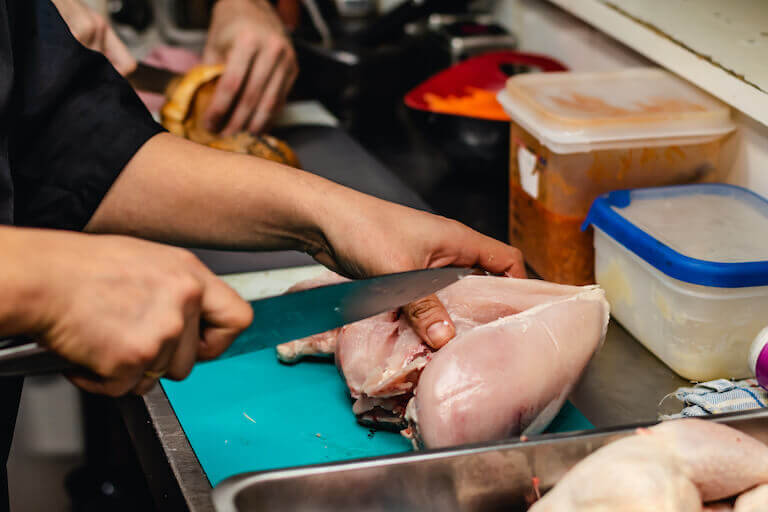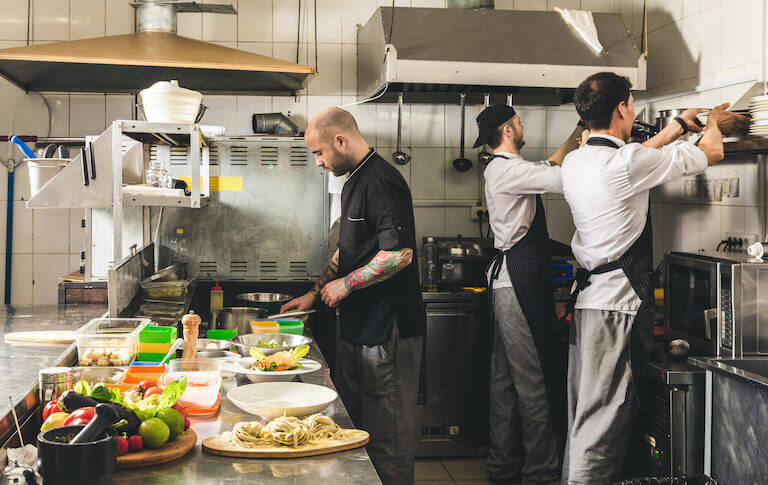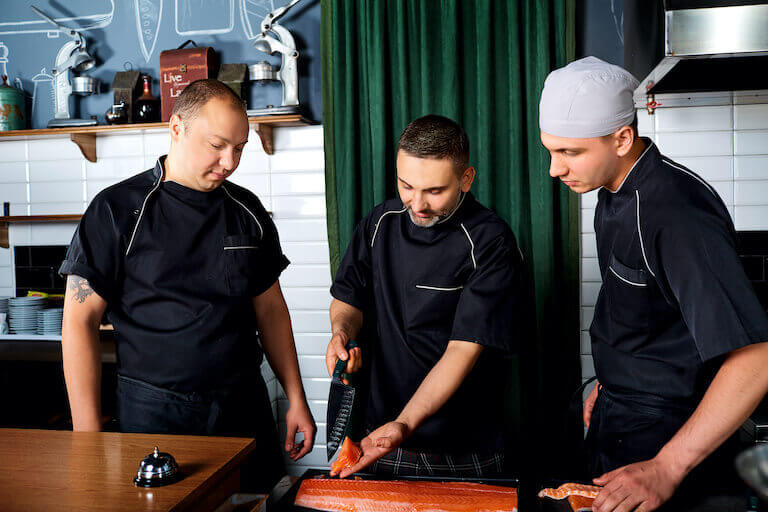Whether you’re honing your knife skills, practicing the mother sauces, or developing your sense for flavor profiles, in order to grow as a chef, you need to get your hands dirty.
Being a professional chef is a hands-on trade, and getting real-world kitchen experience is a necessary part of building your technical skills and advancing your career. But how are you supposed to get the kind of hands-on experience that can really elevate your career?
One traditional avenue has been through the practice of stagiaire. What does this term mean, and how can it benefit you? Let’s take a closer look.
So, What Is a Stagiaire?
A stagiaire (pronounced “sta-zhjer”) is when a cook spends a period of time working in a kitchen without pay (usually), for the purpose of getting some benefit for their career. This benefit could be the opportunity to hone their skills or to build their resume by working at a prestigious restaurant—or, if it’s done as part of the hiring process, it could be an opportunity for the cook to prove that they’d be a good fit for that particular kitchen. A stagiaire, or stage (“stazh”), can be as short as a single shift, or as long as several months.
Common Stagiaire Duties
What duties could you expect to perform during a stagiaire? Depending on the nature of the arrangement, duties might include:
- Prepping vegetables
- Butchering meat
- Cleaning the kitchen
- Washing dishes
- Making sauces
- Working the line
- Plating dishes

A stagiaire can give relatively inexperienced chefs the opportunity to work in fast-paced working kitchens.
Stagiaire is a sort of outgrowth of the tradition of culinary apprenticeship, dating back to 19th century Europe, where young apprentices earned on-the-job training to acquire the skills necessary to become professional chefs. Throughout the 20th century and up to today, the practice has become widespread, especially at higher-end restaurants, where, in theory, aspiring culinarians can acquire skills, experience, and impressive credentials while working alongside renowned chefs.
Stagiaire as Part of the Hiring Process
As we mentioned, cooks might also do a stage as part of the hiring process when trying to land a job. In this arrangement, a stage gives both the potential new hire and the restaurant the chance to suss each other out and see if they would be a good match for one another.
The applicant wants to know whether they’ll fit in with the culture of the restaurant, while the restaurant wants a chance to check out the cook’s technical skills and judge whether they’re up to the job. Though these things can more or less be covered in an interview, having the chance to actually do the work for a shift or two can be a quick and effective way for both parties to get an idea of whether they move forward together.

Training stages, where cooks perform menial tasks without pay, may come under legal scrutiny.
Widely Practiced, Ethically Questionable
While training stages have become common in the restaurant industry, they weren’t always considered ethical. For a long time, they existed in a sort of gray area—they seemed to violate labor standards, but they were also quite widespread in the industry (along with similar unpaid internships in other industries, like film and publishing) and were rarely, if ever, challenged.
This is not to say that every stagiaire is unethical. Some restaurants even compensate people for work they do during trial periods. According to the Fair Labor Standards Act, all employees of for-profit organizations are entitled to a minimum wage and overtime pay, but interns (and students) are not necessarily entitled to that compensation unless they meet certain criteria.
Whether or not you can fit an unpaid stage into your schedule is something you’ll have to balance with your desired trajectory in the industry.

Historically, training stages have been widespread, but the practice may be coming to an end.
How Else Can You Get Practical Experience?
So, if training stagiaires are potentially going extinct, are there any other options for aspiring chefs to get real-world experience in top notch kitchens? Fortunately for those future culinarians, the answer is a definite yes! Obtaining an externship through a culinary school can be a great way for you to get this kind of experience.

Culinary externships can be excellent opportunities for aspiring chefs to gain real-world experience.
A culinary externship is an opportunity for a student to get practical experience working in a real professional kitchen as part of their culinary education. At Auguste Escoffier School of Culinary Arts, students must complete one to two approved industry externships as part of their curriculum in order to graduate from their program.
During their externships, students have the chance to bolster their skill sets, connect with mentors, explore the career paths that interest them—in short, to accelerate their growth, both as chefs and as people. Sometimes these externships can turn into jobs after graduation—but regardless of whether this happens, the connections made and experience gained can prove to be valuable assets throughout the rest of one’s career.
Real-World Training to Ignite Your Culinary Career
Stagiaire is a longstanding practice in the culinary industry, continuing up to today—though the questionable legality and ethics of the practice may mean its days are numbered. Fortunately for aspiring chefs, there are other ways to get similar experience—like externships that are built into the curricula of Escoffier’s culinary programs, which put that real-world experience in the context of broader culinary education.
Accredited degree- and diploma programs are offered at our campuses in Boulder and Austin, and online. And financial aid, grants, and scholarships are available to those who apply and qualify, which can help bring your culinary career goals that much closer to reality.
CHECK OUT THESE ARTICLES NEXT!
- What Chefs Look For When Hiring Culinary School Graduates
- Mentorship in the Mountains: Culinary School Externs Find Guidance at La Marmotte
- 5 Important Networking Tips for All Chefs
*Information may not reflect every student’s experience. Results and outcomes may be based on several factors, such as geographical region or previous experience.



